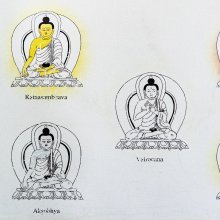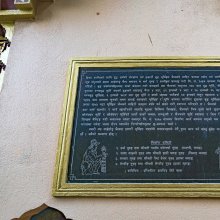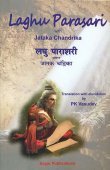Daya, Dayā, Dāya: 25 definitions
Introduction:
Daya means something in Hinduism, Sanskrit, Buddhism, Pali, the history of ancient India, Marathi, Jainism, Prakrit, Hindi, biology. If you want to know the exact meaning, history, etymology or English translation of this term then check out the descriptions on this page. Add your comment or reference to a book if you want to contribute to this summary article.
Alternative spellings of this word include Daay.
Images (photo gallery)
In Hinduism
Shaktism (Shakta philosophy)
Source: Wisdom Library: Śrīmad Devī BhāgavatamDayā (दया, “mercy”):—One of the names attributed to Devī, as chanted by the Vedas in their hymns, who were at the time incarnated in their personified forms. See the Devī-bhāgavata-purāṇa chapter 5.51-68, called “the narrative of Hayagrīva”.
Source: Google Books: Manthanabhairavatantram1) Dayā (दया) refers to “compassion”, according to the Ṣaṭsāhasrasaṃhitā, an expansion of the Kubjikāmatatantra: the earliest popular and most authoritative Tantra of the Kubjikā cult.—Accordingly, “(The true teacher is dedicated to) truthfulness, ritual purity and cleanliness, compassion (dayā), and forbearance; he unites with his wife when it is her season, not out of passion, but for a son for the benefit of (his) clan and lineage. [...] Moreover, he removes error, and he reveals the meaning of the Kula scripture. Previously consecrated, (such a one) should always be made (one’s) teacher”.
2) Dāya (दाय) [=dāyaka?] refers to “that which gives (success)”, according to verse 11.39-45 of the Kularatnoddyota, one of the earliest Kubjikā Tantras.—Accordingly, [as the Goddess addresses Ādinātha ]: “I have seen this unique miracle which inspires wonder. Thus, you have attained another birth from the belly of the fish. This, your excellent spiritual emanation, is graced with the name Matsyendra and this will be your great fame on the surface of the earth. Beloved, this is your lineage which goes by the name Pūrvāmnāya. It is like the reflection of the Western path. Adorned with the six divisions Ānanda, Āvali (and the rest), it gives success (siddhi-dāyaka)”.
Source: Brill: Śaivism and the Tantric Traditions (shaktism)Daya (दय) refers to “compassion”, according to the King Vatsarāja’s Pūjāstuti called the Kāmasiddhistuti (also Vāmakeśvarīstuti), guiding one through the worship of the Goddess Nityā.—Accordingly, “[...] I seek refuge with the glorious goddess Sundarī, the benefactress of prosperity, the secret heart, whose heart is soaked with compassion (daya-ārdra-hṛdaya). She is blazing with an utmost tenacity steeped in joy, and consequently beaming with plenteous light that shimmers spontaneously. [...]”.

Shakta (शाक्त, śākta) or Shaktism (śāktism) represents a tradition of Hinduism where the Goddess (Devi) is revered and worshipped. Shakta literature includes a range of scriptures, including various Agamas and Tantras, although its roots may be traced back to the Vedas.
Pancaratra (worship of Nārāyaṇa)
Source: Wisdom Library: PāñcarātraDayā (दया, “compassion”):—One of the twenty-four emanations of Lakṣmī accompanying Nārāyaṇa. This particular manifestation couples with his counterpart form called Vāmana and together they form the eighth celestial couple. Lakṣmī represents a form of the Goddess (Devī) as the wife of Viṣṇu, while Nārāyaṇa represents the personification of his creative energy, according to the Pāñcarātra literature.

Pancaratra (पाञ्चरात्र, pāñcarātra) represents a tradition of Hinduism where Narayana is revered and worshipped. Closeley related to Vaishnavism, the Pancaratra literature includes various Agamas and tantras incorporating many Vaishnava philosophies.
Purana and Itihasa (epic history)
Source: Cologne Digital Sanskrit Dictionaries: The Purana IndexDayā (दया).—A daughter of Dakṣa, and a wife of Dharma; mother of Abhaya;1 a śakti.2

The Purana (पुराण, purāṇas) refers to Sanskrit literature preserving ancient India’s vast cultural history, including historical legends, religious ceremonies, various arts and sciences. The eighteen mahapuranas total over 400,000 shlokas (metrical couplets) and date to at least several centuries BCE.
General definition (in Hinduism)
Source: archive.org: Vedic index of Names and SubjectsDāya (दाय) occurs in the Rigveda only in the sense of ‘reward’ of exertion (śrama), but later it means ‘inheritance’—that is, a father’s property which is to be divided among his sons either during his lifetime or after his death.
India history and geography
Source: Cologne Digital Sanskrit Dictionaries: Indian Epigraphical GlossaryDāya.—(EI 23), a gift. Note: dāya is defined in the “Indian epigraphical glossary” as it can be found on ancient inscriptions commonly written in Sanskrit, Prakrit or Dravidian languages.

The history of India traces the identification of countries, villages, towns and other regions of India, as well as mythology, zoology, royal dynasties, rulers, tribes, local festivities and traditions and regional languages. Ancient India enjoyed religious freedom and encourages the path of Dharma, a concept common to Buddhism, Hinduism, and Jainism.
Biology (plants and animals)
Source: Google Books: CRC World Dictionary (Regional names)1) Daya in India is the name of a plant defined with Callicarpa macrophylla in various botanical sources. This page contains potential references in Ayurveda, modern medicine, and other folk traditions or local practices It has the synonym Callicarpa salviifolia Griff., nom. nud. (among others).
2) Daya is also identified with Euphorbia pilosa It has the synonym Tithymalus pilosus Hill (etc.).
Example references for further research on medicinal uses or toxicity (see latin names for full list):
· Flore du Kouy-Tchéou (1915)
· Abhandlungen der Koniglichen Akademie der Wissenschaften in Berlin (1859)
· Repertorium Specierum Novarum Regni Vegetabilis (1911)
· Flora of the British India (1885)
· Flora Indica (1820)
· Darjeeling List (1896)
If you are looking for specific details regarding Daya, for example side effects, pregnancy safety, extract dosage, chemical composition, health benefits, diet and recipes, have a look at these references.

This sections includes definitions from the five kingdoms of living things: Animals, Plants, Fungi, Protists and Monera. It will include both the official binomial nomenclature (scientific names usually in Latin) as well as regional spellings and variants.
Languages of India and abroad
Pali-English dictionary
Source: BuddhaSasana: Concise Pali-English Dictionarydayā : (f.) sympathy; compassion; kindness.
Source: Sutta: The Pali Text Society's Pali-English Dictionary1) Dāya, 2 (Sk. dāya, to dadāti, etc.) a gift, donation; share, fee D.I, 87≈(in phrase rājadāya brahmadeyya, a king’s grant, cp. rājadattiya); J.IV, 138; V, 363; VI, 346. Cp. dāyāda & brahmadeyya. (Page 319)
2) Dāya, 1 (Sk. dāva, conflagration of a forest; wood=easily inflammable substance; to dunoti (to burn) caus. dāvayati, cp. Gr. dai/w (to burn) & P. dava1) wood; jungle, forest; a grove Vin.I, 10 (miga°), 15, 350; II, 138; S.II, 152 (tiṇa°); IV, 189 (bahukaṇṭaka d.=jungle); A.V, 337 (tiṇa°); J.III, 274; VI, 278. See also dāva.
— or —
Dayā, (f.) (Ved. dayā, to dayati2) sympathy, compassion, kindness M.I, 78; Sn.117; J.I, 23; VI, 495. Usually as anuddayā; frequent in cpd. dayāpanna showing kindness D.I, 4 (=dayaṃ metta-cittaṃ āpanno DA.I, 70); M.I, 288; A.IV, 249 sq.; Pug.57; VvA.23. (Page 315)

Pali is the language of the Tipiṭaka, which is the sacred canon of Theravāda Buddhism and contains much of the Buddha’s speech. Closeley related to Sanskrit, both languages are used interchangeably between religions.
Marathi-English dictionary
Source: DDSA: The Molesworth Marathi and English Dictionaryḍāya (डाय).—m A plant, Hedysarum Gangeticum.
--- OR ---
dayā (दया).—f (S) Tenderness, compassion, pity, mercy. Pr. dayā udhāra khatā rōkhaḍī. dayākara, dayānidhāna, dayānidhi, dayābdhi, dayāsamudra, dayāsāgara Terms applied to a compassionate or merciful person. dayāpūrita, dayāpūrṇa, dayābharita, dayāyukta, dayāviśiṣṭa, dayāsampanna, dayāśālī, dayāśīla, dayālu or ḷū, dayāḍhya Full of pity, tenderness, gentleness &c. 2 Abridged from dēvadayā.
--- OR ---
dāya (दाय).—m S Property to be divided amongst heirs, an inheritance.
Source: DDSA: The Aryabhusan school dictionary, Marathi-Englishdayā (दया).—f Tenderness, pity, compassion, mercy. dayānidhi, dayābdhi, dayāsamudra, dayāsāgara. Terms app. to a merciful person. dayāṃ dayāṃ Used with karaṇēṃ, karīta phiraṇēṃ Wander about from door to door crying pity! pity! beg about in exceeding abject- ness or wretchedness. dayāṃ dayāṃ hōṇēṃ. Be in a most pitiable condition.
--- OR ---
dāya (दाय).—m An inheritance.
Marathi is an Indo-European language having over 70 million native speakers people in (predominantly) Maharashtra India. Marathi, like many other Indo-Aryan languages, evolved from early forms of Prakrit, which itself is a subset of Sanskrit, one of the most ancient languages of the world.
Sanskrit dictionary
Source: DDSA: The practical Sanskrit-English dictionaryDayā (दया).—[day bhidā-bhāve aṅ] Pity, tenderness, compassion, mercy, sympathy; निर्गुणेष्वपि सत्त्वेषु दयां कुर्वन्ति साधवः (nirguṇeṣvapi sattveṣu dayāṃ kurvanti sādhavaḥ) H.1. 6; R.2.11; यत्नादपि परक्लेशं हर्तुं या हृदि जायते । इच्छा भूमि- सुरश्रेष्ठ सा दया परिकीर्तिता (yatnādapi parakleśaṃ hartuṃ yā hṛdi jāyate | icchā bhūmi- suraśreṣṭha sā dayā parikīrtitā) ||.
--- OR ---
Dāya (दाय).—[dā bhāve-ghañ]
1) A gift, present, donation; रहसि रमते प्रीत्या दायं ददात्यनुवर्तते (rahasi ramate prītyā dāyaṃ dadātyanuvartate) Mālatīmādhava (Bombay) 3.2; प्रीतिदायः (prītidāyaḥ) Mālatīmādhava (Bombay) 4; Manusmṛti 8.199.
2) A nuptial present (given to the bride or the bridegroom).
3) Share, portion, inheritance, patrimony; अनपत्यस्य पुत्रस्य माता दायमवाप्नुयात् (anapatyasya putrasya mātā dāyamavāpnuyāt) Manusmṛti 9.217, 77,164,23.
4) A part or share in general.
5) Delivering, handing over.
6) Dividing, distributing.
7) Loss, destruction.
8) Irony.
9) Site, place.
1) Alms given to a student at his initiation, &c.
11) A relative or a kinsman; तेलङ्गदायसहिता निष्पेतुरहिते तदा (telaṅgadāyasahitā niṣpeturahite tadā) Parṇāl.5. 79.
Derivable forms: dāyaḥ (दायः).
Source: Cologne Digital Sanskrit Dictionaries: Shabda-Sagara Sanskrit-English DictionaryDaya (दय).—mfn.
(-yaḥ-yā-yaṃ) Compassionate, tender-hearted. mf.
(-yaḥ-yā) Tenderness, compassion, clemency. E. day to preserve, affix aṅ, fem. affix ṭāp.
--- OR ---
Dāya (दाय).—m.
(-yaḥ) 1. Gift, donation. 2. A special gift, as a nuptial present, alms to a student at his initiation, &c. 3. Portion, inheritance. 4. Loss, destruction. 5. Breaking, dividing. 6. A place, a site. 7. Irony. E. dā to give, in the passive form, affix ṇa; that which is given; or do to cut, &c. that which is divided. or dāy to give, affix karmaṇi bhāve vā ghañ .
Source: Cologne Digital Sanskrit Dictionaries: Benfey Sanskrit-English DictionaryDayā (दया).—[day + ā], f. Compassion, [Bhagavadgītā, (ed. Schlegel.)] 16, 2.
--- OR ---
Dāya (दाय).—i. e. 1. dā + a, m. 1. A gift, Mahābhārata 1, 6938. 2. Separate property of a wife, [Mānavadharmaśāstra] 9, 77. 3. Delivering, [Mānavadharmaśāstra] 8, 180. 4. Inheritance, [Mānavadharmaśāstra] 9, 217
Source: Cologne Digital Sanskrit Dictionaries: Cappeller Sanskrit-English DictionaryDayā (दया).—[feminine] sympathy, pity for ([locative], [genetive], or —°); poss. vant.†
--- OR ---
Dāya (दाय).—1. [adjective] giving (—°); [masculine] gift.
--- OR ---
Dāya (दाय).—2. [masculine] share, portion, inheritance.
Source: Cologne Digital Sanskrit Dictionaries: Monier-Williams Sanskrit-English Dictionary1) Dayā (दया):—[from day] f. sympathy, compassion, pity for ([locative case] [Mahābhārata; Pañcatantra; Bhartṛhari] etc. ; [genitive case] [Rāmāyaṇa; Harivaṃśa 8486]; in [compound] [Mahābhārata xiv; Hitopadeśa i, 6, 41 ]), [Śatapatha-brāhmaṇa xiv etc.] (yāṃ √kṛ, ‘to take pity on’ [locative case] [Mahābhārata; Hitopadeśa i, 2, 7;] [genitive case] [Vopadeva])
2) [v.s. ...] Pity (daughter of Dakṣa and mother of A-bhaya, [Bhāgavata-purāṇa iv, 1, 49 f.]), [Harivaṃśa 14035;] cf. a-daya; nir-, and sadaya.
3) Dāya (दाय):—[from dā] 1. dāya mfn. ([Pāṇini 3-1, 139]; 141) giving, presenting (cf. śata-, go-)
4) [v.s. ...] m. gift, present, donation, [Mahābhārata; Rāmāyaṇa] etc.
5) [v.s. ...] nuptial fee, [cf. Lexicographers, esp. such as amarasiṃha, halāyudha, hemacandra, etc.] (cf. su-)
6) [v.s. ...] gift at the ceremony of initiation, [Horace H. Wilson]
7) [v.s. ...] handing over, delivery, [Manu-smṛti viii, 165]
8) [v.s. ...] n. game, play, [Pañcadaṇḍacchattra-prabandha]
9) [from dā] 2. dāya m. share, portion, inheritance, [Ṛg-veda; Taittirīya-saṃhitā] etc. (dāyād upāgata, obtained through inheritance, Mit.; dāyam upaiti pitus, he obtains his father’s inheritance, [Brāhmaṇa])
10) [v.s. ...] division, part (ifc. = fold cf. śata-)
11) [v.s. ...] dismembering, destruction, [cf. Lexicographers, esp. such as amarasiṃha, halāyudha, hemacandra, etc.]
12) [v.s. ...] irony, [cf. Lexicographers, esp. such as amarasiṃha, halāyudha, hemacandra, etc.]
13) [v.s. ...] place, site, [cf. Lexicographers, esp. such as amarasiṃha, halāyudha, hemacandra, etc.]
Source: Cologne Digital Sanskrit Dictionaries: Yates Sanskrit-English Dictionary1) Daya (दय):—[(yaḥ-yā)] 1. m. f. Tenderness. a. Compassionate.
2) Dāya (दाय):—[(ṅa-ṛ) dāyate] 1. d. To give.
3) (yaḥ) 1. m. Gift; a portion; loss; breaking; a place; irony.
Source: DDSA: Paia-sadda-mahannavo; a comprehensive Prakrit Hindi dictionary (S)Daya (दय) in the Sanskrit language is related to the Prakrit words: Daya, Dayā, Dāa.
[Sanskrit to German]
Sanskrit, also spelled संस्कृतम् (saṃskṛtam), is an ancient language of India commonly seen as the grandmother of the Indo-European language family (even English!). Closely allied with Prakrit and Pali, Sanskrit is more exhaustive in both grammar and terms and has the most extensive collection of literature in the world, greatly surpassing its sister-languages Greek and Latin.
Hindi dictionary
Source: DDSA: A practical Hindi-English dictionary1) Dayā (दया):—(nf) pity; mercy, compassion; ~[dṛṣṭi] kindly attitude, kindness; •[rakhanā] to continue to be kind, to be compassionate; ~[nidhāna/nidhī/sāgara/siṃdhu] abode of compassion, compassionate, merciful; —[pātra] deserving mercy/compassion; ~[vīra] a hero with a deeply compassionate heart; one imbued with deep compassion; ~[śīla] kindly. kind-hearted, merciful; hence —[śīlatā] (nf).
2) Dāya (दाय) [Also spelled daay]:—(nm) heritage, inheritance; ~[bhāga] inheritance, apportionment of inherited property etc.; ~[bhāgī] an inheritor.
3) Dāyā (दाया):—(nf) see [dāī].
...
Prakrit-English dictionary
Source: DDSA: Paia-sadda-mahannavo; a comprehensive Prakrit Hindi dictionary1) Daya (दय) in the Prakrit language is related to the Sanskrit word: Da.
2) Daya (दय) also relates to the Sanskrit word: Daka.
3) Daya (दय) also relates to the Sanskrit word: Daya.
4) Dayā (दया) also relates to the Sanskrit word: Dayā.
Prakrit is an ancient language closely associated with both Pali and Sanskrit. Jain literature is often composed in this language or sub-dialects, such as the Agamas and their commentaries which are written in Ardhamagadhi and Maharashtri Prakrit. The earliest extant texts can be dated to as early as the 4th century BCE although core portions might be older.
Kannada-English dictionary
Source: Alar: Kannada-English corpusDaya (ದಯ):—[noun] = ದಯೆ [daye].
--- OR ---
Dāya (ದಾಯ):—
1) [noun] a score shown by dice when rolled in games of chance.
2) [noun] an opportune moment.
3) [noun] that by which something is done, obtained or achieved; means.
4) [noun] trickery or craft; artifice.
5) [noun] a malicious, defamatory or false statement or report given against a person in his or her absence.
6) [noun] the condition or quality of being neatly or orderly arranged; tidiness; neatness; orderliness.
7) [noun] the state of equilibrium or equipoise; balanced state.
8) [noun] that which is done or to be done; a work.
9) [noun] extent, quality or size expressed in a standard unit of measurement.
10) [noun] the extent, in space, occupied by something.
11) [noun] one’s physical or mental ability.
12) [noun] the act of considering carefully; careful thought or attention; consideration.
--- OR ---
Dāya (ದಾಯ):—
1) [noun] a gift or present given as a token of love or affection.
2) [noun] a present given to a bride or bridegroom.
3) [noun] a part or portion of one’s aṃcestoṛs property inherited.
4) [noun] in gen. a part or portion that belongs or is allotted to a person; a share.
5) [noun] the act of distribution of a property among several persons.
6) [noun] a dwelling place; an abode; a house.
7) [noun] a play; a game.
8) [noun] the relationship of partners; partnership.
9) [noun] property; possessions; estate.
10) [noun] a donation, contribution as to a charitable organisation.
11) [noun] wages, salary earned; earnings.
12) [noun] the condition or fact of being indebted to another for a favour; indebtedness; obligation.
Kannada is a Dravidian language (as opposed to the Indo-European language family) mainly spoken in the southwestern region of India.
Nepali dictionary
Source: unoes: Nepali-English DictionaryDayā (दया):—n. kindness; pity; mercy; sympathy; tenderness; compassion;
Nepali is the primary language of the Nepalese people counting almost 20 million native speakers. The country of Nepal is situated in the Himalaya mountain range to the north of India.
See also (Relevant definitions)
Starts with (+179): Daya-aunu, Daya-dramma, Dayabandhu, Dayabhaga, Dayabhagakarika, Dayabhaganirnaya, Dayabhaganirnayaviveka, Dayabhagaprakasha, Dayabhagarthadipika padyavali, Dayabhagasiddhanta, Dayabhagasiddhantakumudacandrika, Dayabhagatattva, Dayabhagatika, Dayabhagavinirnaya, Dayabhagaviveka, Dayabhagavyavastha, Dayabhagavyavasthasamkshepa, Dayabhaya, Dayabhuta, Dayabilu.
Ends with (+802): Abadaya, Abbhudaya, Abdaya, Abhishabdaya, Abhivamdaya, Abhyantara-adaya, Abhyudaya, Acaracandrodaya, Acaryahridaya, Accudaya, Acyutaramabhyudaya, Adaya, Adidaya, Adityahridaya, Agamasampradaya, Agastyodaya, Agghodaya, Aggodaya, Aharasamudaya, Ahiddaya.
Full-text (+265): Dayabhaga, Adaya, Nirdaya, Bhutadaya, Dayakrit, Sadaya, Nirdayatva, Dayavat, Dayabandhu, Dayavibhaga, Dayada, Adayam, Dayayukta, Dayashila, Dayapavarttana, Dayam, Sadayam, Nirdayam, Dayakala, Brahmadayahara.
Relevant text
Search found 83 books and stories containing Daya, Dayā, Dāya, Ḍāya, Dāyā, Dayaa; (plurals include: Dayas, Dayās, Dāyas, Ḍāyas, Dāyās, Dayaas). You can also click to the full overview containing English textual excerpts. Below are direct links for the most relevant articles:
Rig Veda (translation and commentary) (by H. H. Wilson)
Manusmriti with the Commentary of Medhatithi (by Ganganatha Jha)
Verse 8.195 < [Section XXXII - Deposits (nikṣepa)]
Verse 10.115 < [Section XIV - Sources of Income (vittāgama)]
Verse 8.180 < [Section XXXII - Deposits (nikṣepa)]
Srila Gurudeva (The Supreme Treasure) (by Swami Bhaktivedanta Madhava Maharaja)
Finding Śrīmatī Rādhārāṇī’s Nose Ring < [Chapter 2.2 - Śrīman Mahāprabhu’s Greatest Donation]
Sri Guru-Parampara By Srila Bhaktisiddhanta Thãkura < [Chapter 1.1 - Śrī Guru Tattva and Śrī Guru Sevaka]
A well-known Kīrtanīyā < [Chapter 1.4 - Life in the Maṭha]
Garga Samhita (English) (by Danavir Goswami)
Verse 6.7.32 < [Chapter 7 - The Marriage of Śrī Rukmiṇī]
Verse 8.13.52 < [Chapter 13 - A Thousand Names of Lord Balarāma]
Verse 1.5.24 < [Chapter 5 - The Lord’s Appearance]
Baudhayana Dharmasutra (by Georg Bühler)
Matangalila and Hastyayurveda (study) (by Chandrima Das)
Epithets containing Elephants < [Chapter 2]
Related products



